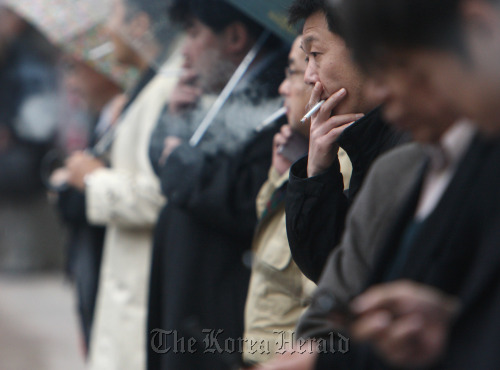A government study found Wednesday that people who are exposed to secondhand smoke have a higher risk of developing diabetes.
The people surveyed were among 10,038 residents in Gyeonggi Province who have been participating in the government’s “Korean Health and Genome Study” since 2001.

Cigarette smoke contains harmful chemicals that cause diabetes as well as cardiovascular and respiratory diseases. (Bloomgerg)
Of the 4,244 non-smokers monitored by the Korea Centers for Disease Control, secondhand smokers had a 1.41 times greater prevalence of type 2 diabetes, which results from insulin resistance, than people who were not exposed to environmental tobacco smoke.
In a similar study conducted on 6,400 salary workers in Japan, nonsmokers who inhaled secondhand smoke were 1.8 times more at risk of diabetes.
The study also found that the risk of diabetes increased with the length of time the person was exposed to secondhand smoke.
Nonsmokers who inhaled cigarette smoke for less than one hour a day showed a 1.34 times higher prevalence of diabetes than those who did not experience any passive smoking.
When the exposure time increased to more than fours hours a day, the prevalence was 1.96 times higher.
“Cigarette smoke contains more than 4,000 harmful chemicals, including at least 50 cancer-causing substances. When inhaled, it induces insulin resistance in which the hormone becomes less effective at lowering blood sugars,” said Kim Sung-soo, director of epidemiology at the Korean disease control agency.
It is also essential for diabetic people to quit smoking in order to prevent complications such as arteriosclerosis, Kim added.
Diabetes is the fifth leading cause of death in Korea, with death rate standing at 19.6 per 100,000 persons. One in 10 Koreans aged 30 or over are believed to have diabetes.
However, smoking in indoor places, which is banned by law, is still prevalent. According to the Ministry of Health and Welfare, 34.5 percent of adult citizens are exposed to second-hand smoke at work, while 15.3 percent experience it at home.
The Korean study result is expected to be published in the January issue of the international journal Annals of Epidemiology.
By Lee Ji-yoon (jylee@heraldcorp.com)




![[KH Explains] No more 'Michael' at Kakao Games](http://res.heraldm.com/phpwas/restmb_idxmake.php?idx=645&simg=/content/image/2024/04/28/20240428050183_0.jpg&u=20240428180321)

